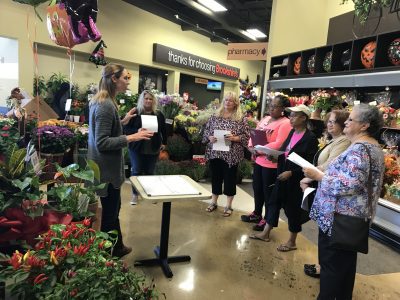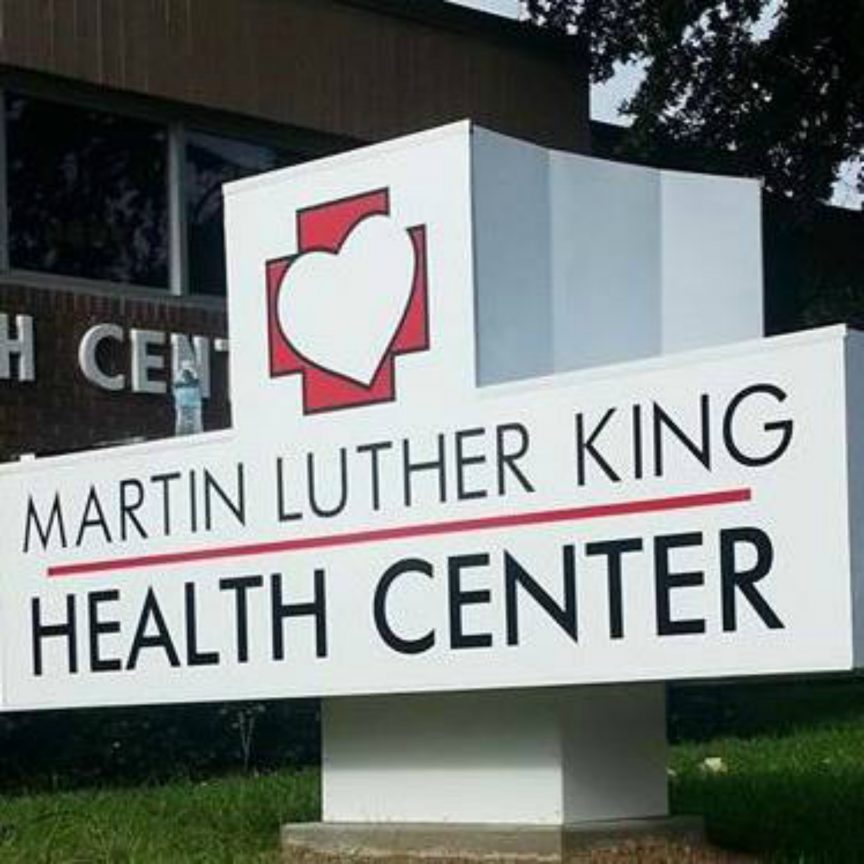Rebecca Montgomery reached a milestone birthday and knew it was time to take better care of herself. An ad on social media caught her eye and put her on a path to a healthier lifestyle. The first stop on her journey — MLK Health Center and Pharmacy.
“I’d seen an ad on Facebook about MLK Health Center offering free mammograms,” Montgomery said. “I wasn’t going to a doctor regularly, and I hadn’t had a mammogram since 2012. I turned 50 this year, so I thought I would take advantage of that because I haven’t been going like I should. So I called, and I have had nothing but great support the whole time.”
Montgomery drove an hour to visit the MLK Health Center and Pharmacy. She got a free mammogram and pap smear. She said her mammogram results came back great. And thanks to her visit, she was able to head off another potential health risk. “They said I was pre-diabetic,” she said. “They offered me the diabetes prevention program, which is another free program they have. Now I come back once a week. I’ve learned what to do — how to eat better and how to stay away from the bad stuff.”
MLK Health Center and Pharmacy, at 865 Olive St. in the Highland neighborhood, is a safety net medical services provider. It provides free primary health care and pharmacy services to patients with chronic illnesses, such as diabetes and heart disease.
For Montgomery, MLK Health Center offered more than a diagnosis. It gave her the support she needed to make real changes in her life. “I’m so proud of this program because it really helps me stay on track,” Montgomery said. “Miss Sadie, she calls me at least once a week. They call me and check on me, and they all are really helpful in making sure that I understand what’s going on.” The diabetes prevention program is eight weeks of education designed to help patients make informed lifestyle decisions. It includes exercise and nutrition tips as well as medical information. Montgomery lost eight pounds in the first two weeks of the program, she said. “They have a garden out there,” Montgomery said. “(They) took us out there and gave us some herbs to cook with and taught us about some of them that are good for us. I’ve learned about starch, like green beans and stuff like that I didn’t realize was really a starch. Also, the nutritionist taught us that it’s better to use real sugar, just not as much.”


Dr. Robert Jackson, medical director at MLK Health Center and Pharmacy, celebrates success stories like Montgomery. Early detection and treatment of breast cancer, in particular, is a mission that hits close to home with him. “My mother died of breast cancer in 1965,” he said. “I was diagnosed with male breast cancer in 1999. In fact, I was the same age when I was diagnosed that my mother was when she died. Breast cancer has had a significant impact on me.”
Dr. Julie Gayle, director of the women’s clinics at the center, said she has seen the increased interest as well among women. In addition to two clinics a month, the center host two events a year — Mammograms and Manicures in October and Ladies Night Out in May — to encourage women to get screenings. She said early detection is key to successfully treating breast cancer and gynecological cancers, including cervical cancer. “With breast cancer, if you can pick it up early, they can undergo treatment,” she said. “Among the gynecological cancers, you can only screen for cervical cancer. It’s not uncommon that we get patients who haven’t had a pap smear in five or 10 years. When you look at the patients who are actually diagnosed with cervical cancer, it’s the women who have missed that screening.”
Filling the gap
MLK Health Center and Pharmacy provides free comprehensive primary care and pharmacy services to those who cannot afford private insurance but do not qualify for Medicaid coverage. Jackson said the center has seen an increased demand in recent years, despite Obamacare and the expansion of Medicaid. He cited the example of a single parent of two children who makes $30,000 a year. That’s too much to qualify for free care but not enough to buy private insurance, Jackson said. “Those people become uninsured,” he said. “When they become uninsured, patients tend to forego routine primary and preventative healthcare.”
Jackson joined with the late Sister Margaret McCaffery to found the center in 1986. He was a resident at LSUHSC School of Medicine and started a Saturday morning clinic at Christian Service’s Hospitality House after seeing many uninsured patients struggle with preventable diseases. MLK Health Center received its own non-profit status in 1986. According to center’s website, it holds the first Charitable Pharmacy permit issued by the Louisiana Board of Pharmacy. The center recently celebrated five years in its current location on Olive Street. The clinic serves 1,700 patients and dispenses 40,000 prescriptions annually at an estimated value of $16 million in services.
The center also serves as a training ground for students in a variety of medical fields. Students from Northwestern State University’s College of Nursing and LSUHSC’s School of Medicine and School of Allied Health Professions, as well as students from LSU Shreveport and Centenary College, gain clinical experience treating patients at the center. The center has offered mammography screenings since its inception, largely cause of Jackson’s history with breast cancer. Jackson said the unique nature of the clinic and MLK Health Center have lowered the threshold for many women to seek treatment. “When we first started offering it, many more women than I thought didn’t want to have it done, and I wasn’t sure why,” Jackson said. “One of the special things about how we do most of our clinics is that patients come in for routinely scheduled appointment usually on a fixed schedule based on the medicines we supply. So patients tend to come in as a group. All 20 patients see each other again and again. They develop relationships. They can be tremendously supportive. It seems to benefit patients, particularly in their willingness and ability to comply with medical recommendations.”
In addition to mammograms and care for diabetes and other chronic conditions, MLH Health Center and Pharmacy offers testing for sexually transmitted diseases. STDs are on the rise in the Shreveport area, which Jackson said is a concern for women for two main reasons. “Not only because of the possibility that assault is involved, but most of the time in men sexually transmitted diseases come to your attention much sooner,” he said. “A substantial amount of the time, women may not have symptoms. They can only be detected on specific screenings.”
Heart issues are another area of concern for women at MLK Health Center and Pharmacy. Dr. Connie Hale, a cardiologist, said women often overlook heart risks and concerns. “Women neglect their heart health,” she said. “When you talk to a woman about her general health and ask her if she has any concerns, it’s usually breast cancer or something along those lines. But heart disease kills more women the breast cancer does.” She said one reason women may miss heart issues is that they do not present in women in all the same ways as men. She said women won’t always feel the chest pain or numbness in their arm that is commonly associated with a heart attack. A woman might experience nausea and vomiting that will pass quickly, or they will break out in cold sweats for no reason.
She also said a woman’s motherly nature can keep her from proper self care. “Women are caretakers,” she said. “We nurture everyone else. We make sure the kids are taken of, the husband’s taken care of. We also have jobs and lots of responsibilities. We often put ourselves last. Just like the airplanes says, when the oxygen drops, put it on yourself first. Generally, I don’t see that women have that mentality.” She offers one piece of advice for anyone when it comes to heart health: “If it ever crosses their mind that they need to have their heart checked, they need to have it checked.”
Gayle and the NSU graduate nursing faculty conduct the clinics with medical students. She said the hands-on training is her favorite part because of the education it provides both the students and the patients. “There should never be a visit with a patient where you don’t have some type of teaching,” she said. “The patients who come here, there are a select few who come yearly or come every couple of years. But more times than not, they haven’t been to the women’s clinic. So this may be their only time with any healthcare provider. A lot of them haven’t seen a healthcare provider in a while, so when they do come in, they will open up to you. You don’t just help them with their women’s health needs. You feel like you get to treat the whole patient. And the students love it. They seem to bond with the patients as well.”
Ways to get involved


For Montgomery and others like her, the staff and volunteers at MLK Health Center and Pharmacy have opened the door to a better life. “My mammogram went well, and that made me really happy,” Montgomery said. “I am going to keep going forward with the diabetes program to teach me the best way. My mother and father were both diabetic, and my mother basically died from diabetes. I’ll be healthier and my family be healthy with all of the research that I’m learning and everything that they’re giving us. They always make sure that we can go home happy. I just hope anybody who needs any help knows that this is the place to get involved.”
For more information about MLK Health Center and Pharmacy, click here.








